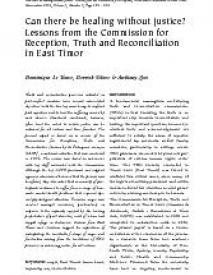Can there be healing without justice? Lessons from the Commission for Reception, Truth and Reconciliation in East Timor
Truth and reconciliation processes initiated in post-conflict countries have several interrelated objectives with the two key aims being to confront past injustices and to heal the suffering caused by such abuses. Structural constraints, however, often limit the extent to which justice can be achieved for all victims and their families. The present report is based on a review of' the Commission for Reception, Truth and Reconciliation (known by its Portuguese acronym CAVR), a national initiative that was concluded in 2005. The review was based on interviews with key staff associated with the Commission. Although the key CAVR personnel and support agencies interviewed believed that the process was beneficial, they also noted that a minority of participants continued to sufferfrom a range of traumatic mental health problems that required special psychological attention. Pervasive anger was evident amongst survivors, particularly in response to the impunity enjoyed by the leading perpetrators of past atrocities, most of whom had sought refuge in Indonesia. Lessons from East Timor and elsewhere suggest the importance of anticipating the inevitable feelings of anger and frustration arising from the limitations of TRC processes in achieving justice for all victims. Keywords: anger, East Timor hanoin barak, impunity, moi, reconciliation
Geachte bezoeker,
De informatie die u nu opvraagt, kan door psychotraumanet niet aan u worden getoond. Dit kan verschillende redenen hebben,
waarvan (bescherming van het) auteursrecht de meeste voorkomende is. Wanneer het mogelijk is om u door te verwijzen naar de bron
van deze informatie, dan ziet u hier onder een link naar die plek.
Als er geen link staat, kunt u contact opnemen met de bibliotheek,
die u verder op weg kan helpen.
Met vriendelijke groet,
Het psychotraumanet-team.
Reference:
Dominique Le Touze, Derrick Silove, Anthony Zwi | 2005
In: Intervention: the international journal of mental health, psychosocial work and counselling in areas of armed conflict, ISSN 1571-8883 | 3 | 3 | 192-202
http://www.interventionjournal.com/sites/default/files/192_202_Touze.pdf
In: Intervention: the international journal of mental health, psychosocial work and counselling in areas of armed conflict, ISSN 1571-8883 | 3 | 3 | 192-202
http://www.interventionjournal.com/sites/default/files/192_202_Touze.pdf


